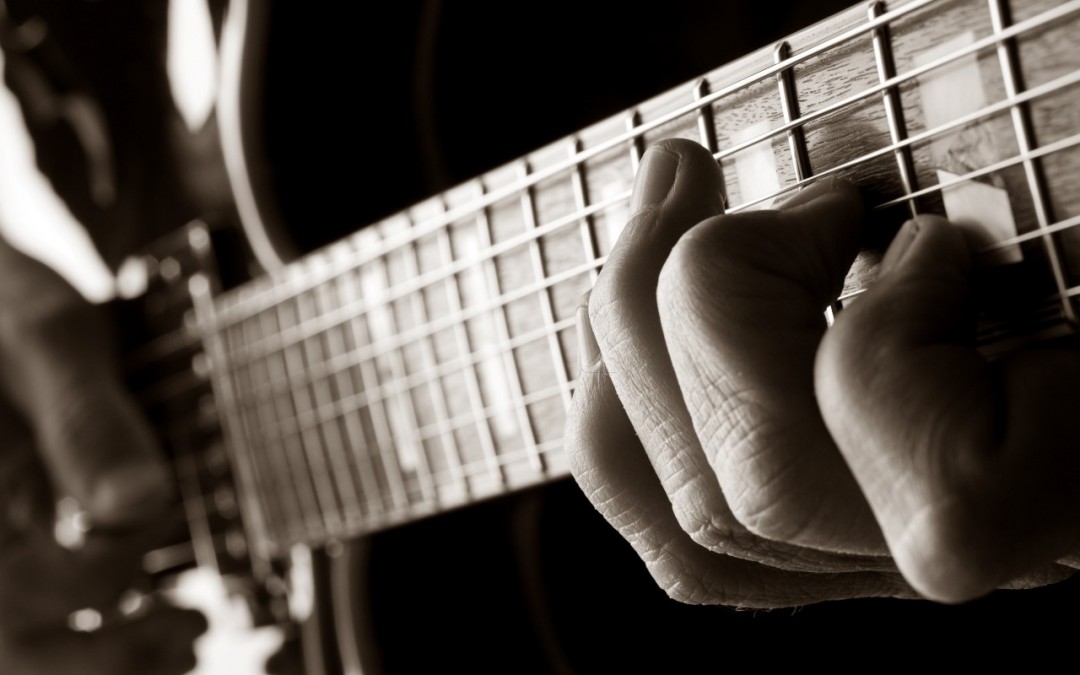Of course, any intermediate guitarist would have more than just these 5 skills, and you may actually be an intermediate guitarist without some of these skills. So it’s important to highlight, that this isn’t a post made to peg you in a certain level, but rather to give guidance to beginners who want to step up to the next level, or to help intermediate guitarists close any gaps they may have so they can progress to the advanced/professional level.
1. Improvisational skills:
In this covers our scales, namely the minor pentatonic and the major scales. Being able to improvise a solo is a pretty key part of being a guitarist, even if they aren’t as common in today’s pop music. For some tips on how to do this, check out this post.
But improvising goes beyond just playing solos, actually, but really it’s about being able to jam with other musicians and create music in the moment. This may mean with riffs, or alternate versions of chords also. Being able to ADD to a song beyond a learned part even if it’s the first time you’re playing through it is a highly valued skill and in my opinion is a key goal of good musicianship.
2. Chord knowledge:
In my opinion, every intermediate guitarist should know their bar chords, 7th chords, 9th chords and major and minor triad inversions. 11ths and 13ths would also be very ideal. Knowing different ways of playing each of these is essential as you don’t want to be limited with just one version of each chord.
What also should come with this is a decent knowledge of chord theory – the make up of chords (you can check out this series of posts starting with this one) and also a good understanding of where the root, 3rd, 5th etc. are in each chord that you play so that then you are able to manipulate the chords, making them suspended, diminished, add a 9th etc.
3. Playing everything to a click:
Timing is essential to your feel and also if you ever want to do any recording and is just an integral part of being a well-rounded musician. At this level you really want to be able to play anything that you do play, to a click, unaccompanied. This also means any solos. Regular click practice really internalises the metronome, allowing your natural playing to not lag or speed up, but just sit in the groove and also helps you to sub-divide notes more accurately and slot in better with other musicians.
4. Tone and effects:
It’s very important that you are beyond plugging in and hoping that it all sounds ok, or that your effects are roughly right. But a working knowledge of how to pull out different sounds without 10 minutes of trial and error, knowing exactly how the eq and different pickups etc. are going to affect your sound.
It is also important to have a working knowledge of your effects, how to pull different delay sounds and overdrives, what other effects you may use and being able to knowingly judge the intensity (e.g. tremolo, phaser). One other key point is to distinguish how much of these effects is needed in live performances vs. rehearsal vs. recording (though often tracking is dry, not always). For a post on this, check out our awesome teacher Ric’s post “Guitarists, Are You Making These 5 Tone Mistakes?”
5. Working out songs by ear:
As well know, music is played for our ears, so it’s important that we develop our ears to use them more effectively. One key way to do that is to work out songs by using just our ears. The more you do this, the more you attach certain sounds with movements on the guitar. This may be licks, or chord progressions, but then this will give your EARS much more control over what you play rather than just your fingers, which is perfect because as mentioned before, music is all about the ears.
Thank you very much for reading! Don’t forget to subscribe, comment, like our facebook page, share etc. and especially contact us for any enquiries about lessons.
Paul
TMTG
